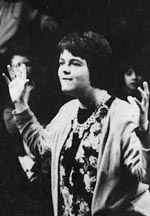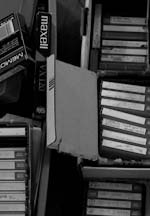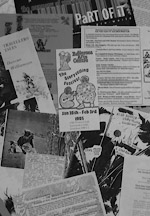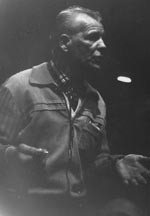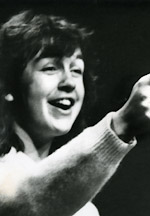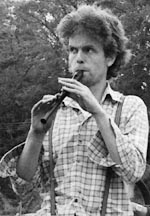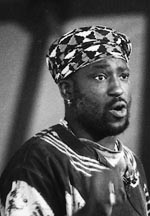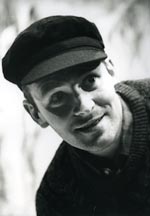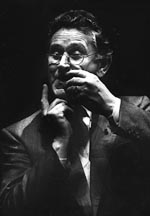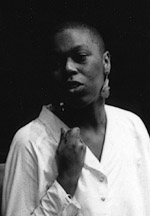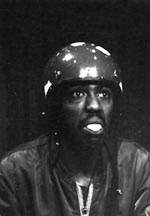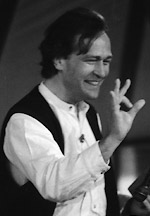An Archive of Performance Storytelling
|
The Archive
The LCIS archive of performance storytelling comprises over 900 audio recordings of storytelling performances, related talks and interviews collected since the early 1980s.
Gems include early work by leading British performance storytellers such as Hugh Lupton, Jan Blake, Ben Haggarty and TUUP, recordings of first UK appearances by International stars such as Abbi Patrix and Laura Simms, as well as superb examples of some of the world's greatest surviving Epic singing traditions such as Central Indian 'Pandavani', Kyrgyz 'Manas' and Bangladeshi, 'Palagan'.
This mass of material collectively documents the redevelopment and revival of the performative aspect of this traditional art in the UK, and the international influences which have shaped and informed it. The resultant archive provides a fascinating
and invaluable record of a significant contemporary creative movement, and represent in many cases the only tangible record of the events at which they were collected. Certainly, as each storytelling is a unique improvisation with no tangible texts
or scripts, this material provides the only record of the performance itself. Storytelling is not only an ephemeral art, but also part of our intangible cultural heritage, and indeed great oral epics are amongst the 'Proclaimed Masterpieces' of the
UNESCO Convention to Safeguard Intangible Cultural Heritage (2003).

|
|
The Material
The archive totals over 900 individual recordings, each with it own record. It features over 220 voices, and spans a period from 1983 to 2007. As a study of a reviving art form, the material included ranges from the raw and experimental, to the poli
shed and formally presented. Most of the material in the archive was collected on an ad hoc basis, with little strategic or long-term view. The archive includes recordings from the experimental club-nights run by The West London Storytelling Unit in
London in the 1980s; material collected by The Company of Storytellers dating from their first tour in 1985 and onwards; recordings collected at the first three International Storytelling Festivals in London in 1985, 87 and 89; from Beyond the Border festival over the years and some more recent recordings from Festival at the Edge, the Barbican Centre and the Unicorn Theatre.
In order to retain the clear remit of the archive, the material was limited to those of storytelling 'performances', defined as events where either the audience paid to see the storyteller, and/or the storyteller was paid to perform. This was an important distinction, but inevitably not every recording in the archive strictly fits the bill. Further more the archive also includes talks, interviews and debates, which may not be considered 'performances', but which relate to performance storytelling, and as storytelling is also often associated with poetry, music and song, these too have been documented to convey the experience of the audience and give a comprehensive record of the events.
Some artists feature hardly or not at all, whilst the work of others can be traced from some of their first public tellings to the present day. Some material has been removed from the archive by artists who would prefer it was not placed in the public domain. Not all storytelling programmers record the shows they organise, and there are sources of recordings which never made it into the archive due to the limited project timescale. In short, the archive is not complete, and as this contemporary art form continues to thrive, it never will be.

|
|
Who is it for?
The archive is a publicly accessible. It is aimed at storytellers, other narrative performance artists, teachers, students, researchers, academics, literature officers and others interested in the revival of this traditional art form in the UK as a
contemporary performance art, and its intangible heritage.
|
|
How does it work?
The archive consists of two elements: sound recordings and documentation. The documentation gives information about each recording, such as the name of the performer, the nature of the performance, the content of the story told, and where and when it was told. For many recordings this information includes images of the storyteller, of programmes and flyers and of other ephemera relating to the event.
The documentation was compiled using a powerful database programme called MODES. The sound recordings cannot be accessed on-line, nor can the original MODES database, but a number of useful indexes derived from it allow access to the documentation on-line as web-pages:
Search the archive on-line.
You can visit one of the hosts of the archive to search the documentation and listen to the recordings.

|
|
Can I buy or copy recordings?
The LCIS can only give the public access to listen to the recordings in person. This means that they cannot be copied, purchased or distributed.
|
|
Where can I find it?
You can search the archive documentation on-line: Search the archive on-line.
The following hosts all hold copies of the sound recordings, as well as the archive documentation either in its original MODEs format, or in the format of webpages, or using their own documentation system.
You can access the full archive with its original MODES documentation at:
Mythstories Museum, The Morgan Library, Aston Street, Wem, Shropshire.
Contact: info@mythstories.com
A mobile archive is also available for storytelling festivals and conferences.
Contact: info@theLCIS.org.uk
You can also access the archive with the documentation in a webpage format at:
The English Folk Dance and Song Society, Cecil Sharp House, London.
Contact: www.efdss.org
Gateshead Central Library, Prince Consort Road, Gateshead. NE8 4LN
Contact: libraries@gateshead.gov.uk
You can access the archive at the British Lubrary, London (where it is incorporated into their own database system) at:
The National Sound Archive, The British Library, London.
Contact: http://cadensa.bl.uk/cgi-bin/webcat

|
|
Who's behind it?
The archive was created and is managed by the London Centre for International Storytelling. The creation of the archive was made possible by the kind support of The Heritage Lottery Fund, and donations of material from organisations, including The Barbican Centre and St Donats Arts Centre, and individuals.
|
|
Donating material
The LCIS is currently seeking further funding to continue the archive, to fill in the gaps where existing material has not been included, and to collect further material. It is also working to document the audio-visual materials of storytelling it h olds. If you have recordings of storytelling performances, we would like to hear from you, though at this point, we may simply register the existence and location of the material, as we need to secure funding before we can commit to processing new material.

|
OTHER LCIS PROJECTS
|
